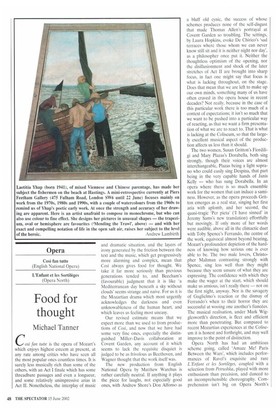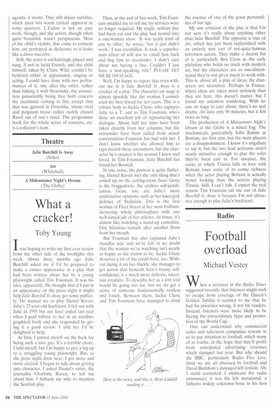Food for thought
Michael Tanner
Cosi fan tune is the opera of Mozart's which enjoys highest esteem at present, at any rate among critics who have seen all the most popular ones countless times. It is surely less musically rich than some of the others, with an Act I finale which has some threadbare passages and even a longueur, and some relatively unimpressive arias in Act II. Nonetheless, the interplay of music and dramatic situation, and the layers of irony generated by the friction between the text and the music, which get progressively more alarming and complex, mean that Cosi always gives food for thought. We take it far more seriously than previous generations tended to, and Beecham's (favourable) judgment that it is like `a Mediterranean day beneath a sky without clouds' seems strange and naive. For us it is the Mozartian drama which most urgently acknowledges the darkness and even unknowableness of the human heart, and which leaves us feeling most uneasy.
Our revised estimate means that we expect more than we used to from productions of Cosi, and now that we have had some very fine ones, especially the distinguished Miller–Davis collaboration at Covent Garden, any account of it which seems to lack the requisite disquiet is judged to be as frivolous as Beethoven, and Wagner thought that the work itself was.
The new production from English National Opera by Matthew Warchus is rather carefully neutral. If anything it plays the piece for laughs, not especially good ones, with Andrew Shore's Don Alfonso as a bluff old cynic, the success of whose schemes produces none of the self-disgust that made Thomas Allen's portrayal at Covent Garden so troubling. The settings, by Laura Hopkins, evoke De Chirico's 'sad terraces where those whom we can never know still sit and it is neither night nor day', as a philosopher once put it. Neither the thoughtless optimism of the opening, nor the disillusionment and shock of the later stretches of Act II are brought into sharp focus, in fact one might say that focus is what is lacking throughout, on the stage. Does that mean that we are left to make up our own minds, something many of us have often craved in the opera house in recent decades? Not really, because in the case of this particular work there is too much of a context of expectations; it isn't so much that we want to be pushed into a particular way of reacting, as that we want a firm presentation of what we are to react to. That is what is lacking at the Coliseum, so that the largely excellent musical aspect of the production affects us less than it should.
The two women, Susan Gritton's Fiordiligi and Mary Plazas's Dorabella, both sing strongly, though their voices are almost interchangeable, Plazas being a light soprano who could easily sing Despina, that part being in the very capable hands of Janis Kelly — who has sung Dorabella. In an opera where there is so much ensemble work for the women that can induce a sarniness. However, as the opera proceeds Gritton emerges as a real star, singing her first aria with aplomb, and her second, the quasi-tragic 'Per pieta' CI have sinned' in Jeremy Sams's new translation) effortfully but movingly. If only more of her words were audible, above all in the climactic duet with Toby Spence's Ferrando, the centre of the work, equivocal almost beyond bearing, Mozart's profoundest depiction of the hardness of knowing how serious one is ever able to be. The two male lovers, Christopher Maltman contrasting strongly with Spence, sing less well than they might because they seem unsure of what they are expressing. The confidence with which they make the wager at the start, which should make us anxious, isn't really there — not on the first night, anyway. Nor is the savagery of Guglielmo's reaction or the dismay of Ferrando's when to their horror they are successful at wooing one another's fiancées. The musical realisation, under Mark Wigglesworth's direction, is fleet and efficient more than penetrating. But compared to recent Mozartian experiences at the Coliseum it is honest and forthright, and may well improve to the point of distinction.
Opera North has had an ambitious scheme going, called 'Amaze Me! Paris Between the Wars', which includes performances of Ravel's exquisite and rare L'Enfant et les Sortileges, coupled with a selection from Petnishka, played with more enthusiasm than precision, and danced to an incomprehensible choreography. Comprehension isn't big on Opera North's
agenda, it seems. They still abjure surtitles, which must win warm critical approval in some quarters. L'Enfant is not an easy work, though, and the action, though often quite beautiful, wasn't perspicuous. Most of the child's victims, that come to torment him, are portrayed as skeletons, so it looks like a danse macabre.
Still, the score is enchantingly played and sung, if not in lucid French, and the child himself, taken by Claire Wild, couldn't be bettered either in appearance, singing or acting. I could have done with two performances of it. one after the other, rather than linking it with Stravinsky, the connection presumably being that both concern the inanimate coming to life; except that that was ignored in Petrushka, whose vivid and poignant music rather rudely chased Ravel out of one's mind. The programme book for the whole series of concerts, etc. is a collector's item.



































































 Previous page
Previous page